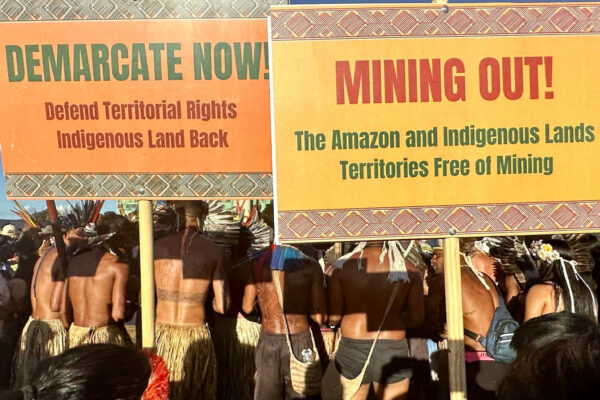Environmental activists in Ecuador are fighting to persuade the government to divert the course of a new oil pipeline away from one of South America’s most important bird reserves.
Fourteen of the activists were arrested in March when police broke up their camp high up in the Mindo Nambillo cloud forest reserve west of the capital Quito.
Wilfrido Vaca: Worried about
seismic activity
They had built platforms up in the trees in a bid to thwart the construction of the pipeline, which they say presents a dangerous threat to a forest boasting an extraordinary diversity of birdlife, animals and flora.
Wilfrido Vaca, one of the protest leaders, who was arrested last month, says the whole eco-system of the area is threatened by the new construction.
“At one point the pipeline has to go over a ridge that is only 80 centimetres wide, and that is just impossible,” he said. “This is also an area of much seismic activity and we are only a few kilometres from two active volcanoes.”
Forest under threat
Part of the pipeline route goes through an area that since the 1980s has been designated a protected forest by the Ecuadorian Government.
The new oil pipeline will run from east
to west, through Mindo Nambillo
The designation is largely due to the work of Pedro Peñafiel who spent three solitary years charting the flora and fauna of the cloud forest.
“People said I was crazy,” he said, sitting in his home in the village of Mindo watching as humming birds swarm to the feeders he has set up outside the window. Mindo Nambillo is internationally known for its humming birds.
It also boasts more than 3,000 species of orchid and is home to the spectacled bear, a rare creature found only in South America.
Pedro Peñafiel describes the decision to route the new pipeline through Mindo Nambillo as “absolutely perverse”.
Oil spills
Oil spills are the big fear, and if the history of Ecuador’s oil industry is anything to go by, the fear is a real one.
Activists say that more oil has leaked into the ground as a result of accidents, incompetence or sheer indifference in the 30 years since oil exploitation began in Ecuador, than was spilled in the Exxon Valdez super tanker disaster off Alaska in 1989.
Pedro Peñafiel spent years charting
the flora and fauna of the cloud forest
A visit to the oil fields around the town of Lago Agrio in the Amazon Basin bears witness to the problem.
Oil waste is collected in vast pools often on agricultural land, making further cultivation impossible.
Gas is burned off giving the impression of giant Bunsen burners lighting up the sky. And small spills are shovelled up, put in plastic bags and buried.
The whole area reeks of oil and local farmers talk of how the groundwater is contaminated large black drops forming on the vegetation when it rains.
Local people also feel that the vast amount of money made by the oil industry does not trickle down to them.
Government unmoved
Hernan Lara: The consequences of not
completing the pipeline would be very grave
In February this year protests against the industry became so fierce that a state of emergency was declared around Lago Agrio and the army was sent in to break up the disturbances.
The government is unmoved. It says the new pipeline, the OCP, will enable the country to double oil production and thus earn millions of dollars in much needed hard currency.
Copyright BBC













